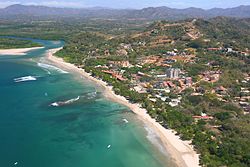grīva
Latvian

Etymology
From Proto-Balto-Slavic *grī́ˀwāˀ, from Proto-Indo-European *gʷriHweh₂ (“neck, nape”), from the stem *gʷer- (“to swallow”), whence also Latvian dzert (“to drink”)). Cognates include Proto-Slavic *griva (“mane”) (Russian гри́ва (gríva, “mane”) (dialectal also “narrow bay,” “steep river bank”), Belarusian гры́ва (hrýva, “mane”) (dialectal also “dry place in a swamp”), Ukrainian гри́ва (hrýva, “mane”), Czech hříva, Polish grzywa), Sanskrit ग्रीवा (grīvā́, “neck”).[1]
Pronunciation
| Audio: | (file) |
Noun
grīva f (4th declension)
- estuary, mouth (the place at which a river reaches the sea)
- padziļināt upes grīvu ― to deepen the river's estuary
- pie Daugavas grīvas bija pārāk daudz zvejnieku ― at the mouth of the Daugava there were too many fishermen
Declension
Declension of grīva (4th declension)
References
- ^ Karulis, Konstantīns (1992) “grīva”, in Latviešu Etimoloģijas Vārdnīca (in Latvian), Rīga: AVOTS, →ISBN
Categories:
- Latvian etymologies from LEV
- Latvian terms inherited from Proto-Balto-Slavic
- Latvian terms derived from Proto-Balto-Slavic
- Latvian terms inherited from Proto-Indo-European
- Latvian terms derived from Proto-Indo-European
- Latvian terms with IPA pronunciation
- Latvian words with level intonation
- Latvian terms with audio links
- Latvian lemmas
- Latvian nouns
- Latvian feminine nouns
- Latvian terms with usage examples
- Latvian fourth declension nouns
- lv:Hydrology
